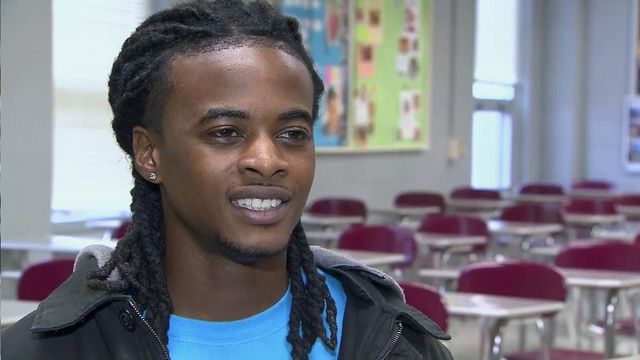NCCU sophomore mistakenly jailed for 'doing the right thing'
Durham authorities dismissed serious criminal charges against Lewis James Little nearly a year ago, but the 20-year-old North Carolina Central University sophomore says he's still dealing with the stigma of being arrested and mistakenly accused.
Posted — UpdatedHe and several friends had been visiting the home of a childhood friend on Melbourne Street in east Durham on the night of June 20, 2013, when, he says, they discovered 25-year-old Michael Lee dead in the middle of the road.
"I called the police – when none of the other guys were even thinking about it – trying to do the right thing, and it pretty much started from there," Lewis said.
Twenty minutes after officers arrived, he was handcuffed and later jailed under a $1.425 million bond on burglary, kidnapping and several other criminal charges in connection with a break-in at a nearby home.
"You can do good your whole life and like that, (you're in jail under) a million-dollar bond," he said. "It was kind of like a dream. I kept waking up, like, 'I can't believe I'm in here.' I kind of felt defeated."
Then, on July 15, a corrections officer told him he was free to go. The Durham prosecutor working the case dropped the charges and apologized to Little.
A witness in the home invasion had identified Little as one of three men who broke in, but statements to police called into question that identification, authorities say.
"You can assume a lot just from looking at my face and dreads. I was in basketball shorts and flip flops," Little said. "Something like that happening to them – I can kind of understand that maybe they would jump to conclusions."
Arrest's stigma continues for Little
Little had been wrongly accused, and even though the case was dismissed, the damage was already done. Since then, he says, he has had issues finding both housing and employment.
"I feel ashamed about it, because I don't want to be known like that," he said. "It's up there, and there's no taking it back."
Knowing what he knows now, Little says that if he had to do it again, he would have ignored the dead body in the street.
"I felt like it was the right thing to do (by calling police)," Little said. "I did, and I suffered from it."
Little's experience not uncommon
Irving Joyner, a law professor at North Carolina Central University, says Little's experience isn't unlike that of other black people's encounters with police.
"His resemblance to the person who actually did it or what information was provided to the officer was probably a catalyst in what happened to him," Joyner said.
That's partly why, he says, people won't report crimes, cooperate or answer police questions.
"They don't want to run the risk that they'll end up being the target of an investigation. It's a valid fear that people have," Joyner said. "People often have this notion that, if it is an African-American young person, it is highly likely that they participated in the crime, if they were anywhere physically close to it."
Little wants to keep moving forward
But Joyner says there aren't many legal options for Little and that any kind of lawsuit against police would likely fail.
"The opportunities for redress are limited in these situations," he said. "The law protects police officers. The theory is you don't want to have police subject to lawsuits every time they do something."
A more successful option would be for Little to get his record expunged, and while he is considering the option, Little says he doesn't think the burden should be on him to clear his name.
While what happened angers him, Little says, he isn't going to let it cloud his vision for the future.
"Holding onto the anger every day doesn't get you anywhere, so most definitely, I'm mad, but I still have other stuff going on," he said. "So, I have to balance that, and keep moving forward."
• Credits
Copyright 2024 by Capitol Broadcasting Company. All rights reserved. This material may not be published, broadcast, rewritten or redistributed.





